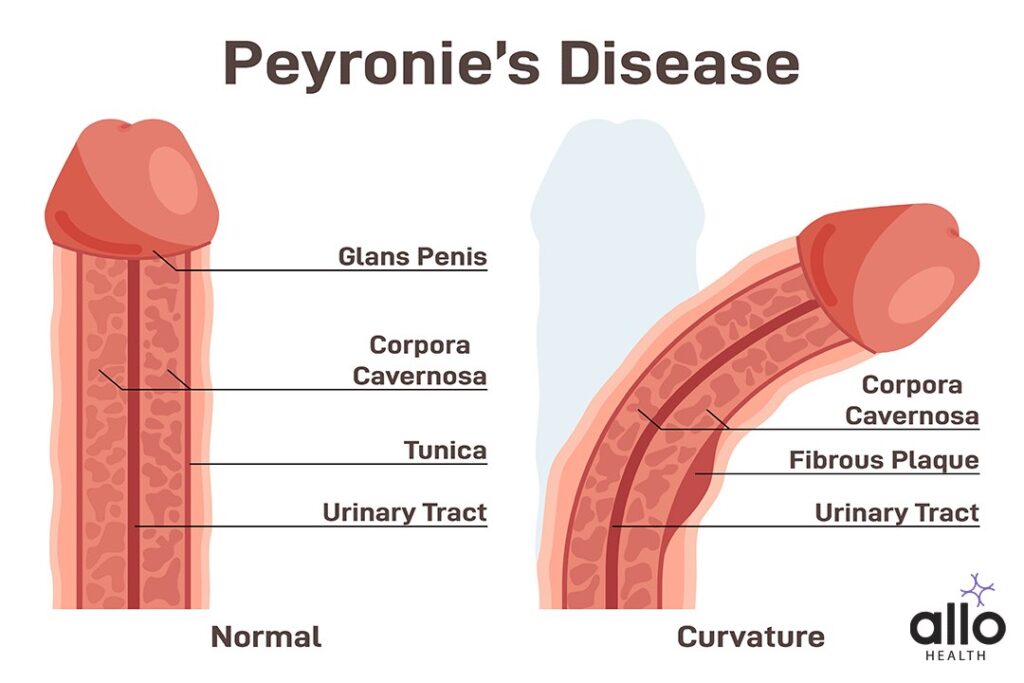Peyronies Disease Treatment

Allo Health is dedicated to personalized well-being, offering support and trusted information tailored to individual health goals. The platform emphasizes human-generated content, led by a distinguished medical team of experts, including physicians and sexual health specialists. Their commitment to credibility involves rigorous fact-checking, authoritative research, and continuous updates to ensure accurate, up-to-date information. Allo Health's unique approach goes beyond conventional platforms, providing expert-led insights and a continuous commitment to excellence, with user feedback playing a crucial role in shaping the platform's authoritative voice.

A Psychotherapist with Clinical specialization, working for over seven years now. Areas of specialization range from Anxiety-related disorders, Mood-related disorders, Personality disorders, Sexual dysfunctions & other mental health issues.
Why This Was Upated?
Our experts continually monitor the health and wellness space, and we update our articles when new information became available.
Updated on 18 April, 2024
- Article was updated as part of our commitment to diversity, equity, and inclusion.

"The following blog article provides general information and insights on various topics. However, it is important to note that the information presented is not intended as professional advice in any specific field or area. The content of this blog is for general educational and informational purposes only.
Book consultation
The content should not be interpreted as endorsement, recommendation, or guarantee of any product, service, or information mentioned. Readers are solely responsible for the decisions and actions they take based on the information provided in this blog. It is essential to exercise individual judgment, critical thinking, and personal responsibility when applying or implementing any information or suggestions discussed in the blog."
What is Peyronie’s Disease?
Peyronie’s Disease is a medical condition that leads to a curved penis; it can become indented or develop a lump or plaque. This can lead to pain during erections, difficulty with sexual intercourse, and psychological distress. Let’s explore the various treatment options available for Peyronie’s Disease, and the pros and cons of each treatment. However, it is important to note that penis sizes and shapes differ, and in many circumstances men can have a slight curvature – which is normal.
Is Peyronies Disease a sexual dysfunction?
Yes, Peyronie’s disease is considered a sexual dysfunction, as it can lead to a range of concerns with sexual functioning. The most common sexual concern associated with Peyronie’s disease is erectile dysfunction – the difficulty in achieving or maintaining an erection. It can affect erectile functioning. The curvature or shortening of the penis can make it difficult for blood to flow into the penis, leading to erectile dysfunction.
In addition to erectile dysfunction, Peyronie’s disease can also cause pain during sexual activity, making it difficult or uncomfortable to engage in sexual activity. The emotional impact of Peyronie’s disease can also lead to decreased sexual desire, anxiety, and depression.
Understanding The Degrees Of Curvature With Peyronies Disease

There are three degrees of curvature associated with Peyronie’s disease. These are:
Mild curvature
Mild curvature is when the penis is slightly bent, but it is still able to function normally. This degree of curvature usually does not cause any pain or discomfort during sex. However, it is important to note that mild curvature can progress to more severe forms if left untreated.
Moderate curvature
Moderate curvature is when the penis is noticeably bent, but it is still able to achieve an erection. However, sex may be uncomfortable or painful, depending on the severity of the curvature. Men with moderate curvature may also experience difficulty with ejaculation.
Severe curvature
Severe curvature is when the penis is bent at a severe angle, making it difficult or impossible to achieve an erection. Men with severe curvature may also experience pain and discomfort during sex.
It is important to note that Peyronie’s disease can affect men of all ages, although it is more common in older men. It is also important to seek medical attention if you notice any changes in the shape or function of your penis, as early intervention can help prevent the disease from progressing.
Nonsurgical Management
Non-surgical treatments for Peyronie’s Disease include medications, penile injections, and the use of penile traction devices.
Medications
Some oral medicines have been shown to help reduce the pain and inflammation associated with Peyronie’s Disease. These include non-steroidal anti-inflammatory drugs (NSAIDs) and vitamin E supplements. However, there is limited evidence that they can actually reduce the curvature of the penis.
Penile injections
Penile injections involve the use of drugs such as verapamil or collagenase that are injected directly into the plaque or scar tissue. These medications are believed to break down the plaque and improve the curvature of the penis. However, injections can be painful, and there is a risk of side effects, such as bruising, bleeding, or infection.
Penile traction devices
Penile traction devices are a type of medical device that can be worn on the penis to exert a stretching force, which is believed to help reduce the curvature of the penis. However, the effectiveness of traction devices for Peyronie’s Disease is still being studied, and there is limited evidence to support their use.
Surgical Management
Surgical treatments for Peyronie’s Disease include plication, incision and grafting, and penile prosthesis.
Plication
Plication involves the placement of stitches on the side of the penis opposite to the curvature. This helps to straighten the penis by shortening the longer side. This surgery is generally reserved for men with a small curvature.
Incision and grafting
This surgery involves making an incision in the plaque or scar tissue and replacing it with a graft of healthy tissue. This helps straighten the penis by replacing the plaque with healthy tissue. This surgery is generally reserved for men with a large curvature.
Penile prosthesis
This surgery involves the placement of an inflatable device in the penis. This device allows the man to achieve an erection by pumping fluid into the cylinders in the penis. This surgery is generally reserved for men who have not responded to other treatments or who have severe curvature.
Pros & Cons Of Treatment Options
Pros and Cons of treatment options Each treatment option has its own set of advantages and disadvantages, and it is important for health care providers and patients to carefully consider these when making a treatment decision.
Non-surgical treatments
Pros
- Non-invasive: These treatments do not involve surgery or general anesthesia.
- Low risk: The risk of complications is relatively low.
- Affordable: These treatments are generally less expensive than surgery.
Cons
- Limited effectiveness: The effectiveness of non-surgical treatments for Peyronie’s Disease is still being studied, and there is limited evidence to support their use.
- Side effects: Penile injections can be painful and cause bruising, bleeding, or infection.
- Inconvenience: Traction devices require consistent use and may not be practical for all men.
Surgical treatments
Pros
- High success rate: Surgical treatments have a higher success rate than non-surgical treatments.
- Permanent results: Surgical treatments can provide permanent results.
- Effective for severe cases: Surgical treatments may be the best option for men with severe curvature or who have not responded to other treatments.
Cons
- Invasive: Surgical treatments require anesthesia and involve incisions and the placement of medical devices.
- Higher risk
Which Treatment Option Is Right For You?
Choosing the right treatment option can be a daunting task for many patients. That’s where sexual health experts come in; they can help patients make an informed decision about which treatment option is right for them.
Let’s recap the different treatment options available, the factors that sexual health experts consider when recommending a treatment, and the benefits of seeking help from a sexual health expert.
Types of Peyronie’s Disease Treatments
There are several treatment options available for Peyronie’s Disease. These include:
- Oral Medications: Oral medications, such as vitamin E and colchicine, are commonly used to treat Peyronie’s Disease. These medications can help reduce the pain and inflammation associated with the condition.
- Topical Medications: Topical medications, such as verapamil gel, are applied directly to the affected area of the penis. They can help reduce the size of the fibrous plaque and improve the patient’s ability to achieve and maintain an erection.
- Injection Therapy: Injections of a medication called Xiaflex can help break down the fibrous plaque in the penis, which can improve the patient’s ability to achieve and maintain an erection.
- Surgery: Surgery is usually recommended for patients who have a severe curvature of the penis or who have not responded to other treatment options. There are several surgical options available, including plication, grafting, and implantation of a penile prosthesis.
Factors Considered by Sexual Health Experts
When recommending a treatment option for Peyronie’s Disease, sexual health experts consider several factors. These include:
- Severity of the Condition: The severity of the condition is one of the most important factors that sexual health experts consider. They will assess the size and location of the fibrous plaque, as well as the degree of curvature of the penis.
- Patient’s Age and General Health: The patient’s age and general health are also important factors. Older patients or those with underlying medical conditions may not be good candidates for certain treatment options, such as surgery.
- Patient’s Sexual Function: Sexual health experts will consider the patient’s sexual function and the impact that Peyronie’s Disease is having on their ability to achieve and maintain an erection.
- Patient’s Preferences: Finally, sexual health experts will take the patient’s preferences into account. Some patients may prefer non-invasive treatments, while others may be willing to undergo surgery to achieve the best possible outcome.
Benefits of Seeking Help from a Sexual Health Expert
There are several benefits to seeking help from a sexual health expert when choosing a treatment option for Peyronie’s Disease. These include:
- Expertise: Sexual health experts have specialized knowledge and training in the diagnosis and treatment of sexual health conditions, including Peyronie’s Disease.
- Personalized Care: Sexual health experts will work with the patient to develop a personalized treatment plan that takes into account their individual needs and preferences.
- Access to the Latest Treatments: Sexual health experts stay up-to-date with the latest advances in the field of sexual health, including new treatment options for Peyronie’s Disease.
- Emotional Support: Dealing with a condition like Peyronie’s Disease can be stressful and emotionally challenging. Sexual health experts can provide emotional support and counseling.
The first step in treating Peyronie’s disease is understanding the condition. A sexual health expert will conduct a thorough examination of your penis, including an assessment of the degree of curvature, the location of the plaque or scar tissue, and any associated pain or discomfort. They may also ask about your medical history, sexual history, and any other relevant information to help them understand the nature of your condition. With a clear understanding of your Peyronie’s disease, the sexual health expert can then recommend the best course of treatment. In many cases, Peyronie’s disease can be treated without surgery.
Peyronie’s is common, affecting around 5-10% of men, and can have a significant impact on a person’s sexual and psychological well-being. If you are experiencing symptoms of Peyronie’s disease, it is important to seek treatment from a sexual health expert.
Does Family History Matter?
The short answer is that family history may play a role in the development of Peyronie’s Disease, but it is not a determining factor when it comes to treatment options. Let’s take a closer look at what Peyronie’s Disease is, the role of family history, and how it may impact treatment.
While the exact cause of Peyronie’s Disease is unknown, there is evidence to suggest that genetics may play a role. Studies have shown that men with a family history of Peyronie’s Disease are at an increased risk of developing the condition themselves. This suggests that there may be a genetic component to the development of the disease.
How Does Family History Impact Treatment?
While family history may play a role in the development of Peyronie’s Disease, it does not necessarily impact treatment options.
It is important for patients to discuss their family history with their health care providers when seeking treatment for Peyronie’s Disease. While family history may not impact treatment options, it can help the healthcare provider to better understand the patient’s risk factors and tailor treatment accordingly.
What can patients do to manage Peyronie’s disease and improve sexual function?
If you are experiencing symptoms of Peyronie’s disease, it is important to seek medical attention from a health care provider who is experienced in treating the condition. Treatment options may include medications, physical therapy, or surgery, depending on the severity of the condition.
In addition to medical treatment, there are several lifestyle changes that can help manage Peyronie’s disease and improve sexual function. These may include:
- Maintaining a healthy weight and eating a balanced diet.
- Engaging in regular exercise, such as walking, swimming, or yoga.
- Quitting smoking and avoiding alcohol and drug use.
- Engaging in stress-reducing activities, such as meditation or deep breathing.
- Seeking support from a mental health professional, if needed.
How Does Peyronie’s Disease Cause Sexual Dysfunction?
Peyronie’s Disease can cause sexual dysfunction in a number of ways.
- Firstly, the curvature of the penis can make it difficult or impossible to achieve an erection, as the blood flow to the penis is restricted. This can lead to a loss of libido and a reduced interest in sexual activity.
- In addition, the buildup of scar tissue in the penis can cause pain and discomfort during sexual activity. This can make it difficult for a man to maintain an erection, and can also cause anxiety and stress around sexual activity.
- Furthermore, Peyronie’s Disease can cause emotional distress, which can also lead to sexual dysfunction. Men who are experiencing depression, anxiety, or low self-esteem due to their condition may find it difficult to engage in sexual activity, and may struggle to maintain an erection.
For men who are experiencing sexual dysfunction as a result of Peyronie’s Disease, there are a number of treatments available, including medications such as phosphodiesterase inhibitors, which help to improve blood flow to the penis and promote erections. Vacuum erection devices may also be recommended to help with achieving and maintaining an erection.
Mental health And Peyronies Disease

Mental health can play a significant role in the lives of those diagnosed with Peyronie’s disease. The physical symptoms of the condition can lead to anxiety, depression, and low self-esteem, which can further exacerbate mental health concerns. Let’s understand the correlation between mental health and Peyronie’s disease, and how patients can manage their mental health while dealing with this condition.
The Psychological Impact of Peyronie’s Disease
The physical symptoms of Peyronie’s disease can have a significant impact on a patient’s mental health. The condition can cause pain, discomfort, and difficulty during sexual intercourse, leading to anxiety and depression. The deformity of the penis can also cause embarrassment, shame, and a lack of confidence, affecting relationships and social life. Patients may feel self-conscious and avoid sexual encounters, or they may feel embarrassed discussing their condition with their partner.
Depression is common among those with Peyronie’s disease, as they may feel isolated and suffer from a loss of self-worth. The condition can also affect a patient’s ability to work or engage in physical activities, further impacting their mental health. A study conducted by the University of California, San Francisco, found that patients with Peyronie’s disease were three times more likely to experience depression than the general population.
Anxiety is another common mental health issue experienced by those with Peyronie’s disease. Patients may worry about the progression of their condition, the effectiveness of treatments, and their sexual performance. The anxiety can further exacerbate physical symptoms, leading to a vicious cycle of anxiety and physical discomfort.
Managing Mental Health While Dealing with Peyronie’s Disease
While Peyronie’s disease can be a challenging condition to manage, there are several ways patients can manage their mental health and improve their overall well-being.
- Firstly, it’s essential to seek professional support from a mental health expert. A mental health expert can provide patients with the necessary coping mechanisms to manage anxiety, depression, and other mental health concerns. They can help patients develop skills to cope with stress, such as relaxation techniques, meditation, and mindfulness.
- Secondly, patients should consider joining support groups, either in-person or online, to connect with others going through a similar experience. Support groups provide a safe space for patients to share their experiences and learn from others, helping to reduce feelings of isolation and improve their overall mental health.
- Thirdly, maintaining a healthy lifestyle can also help improve mental health. Patients should prioritize regular exercise, a balanced diet, and adequate sleep. Exercise can help reduce stress and improve self-esteem, while a healthy diet can improve overall well-being.
- Finally, it’s important to communicate with partners and family members about the condition. Open communication can help reduce feelings of isolation and shame, and partners can provide emotional support during the treatment process.
Sexual health is as important as physical and mental health. In most cases, one consultation can go a long way. Personalised, discreet, and judgement-free treatment at your fingertips – book an online consultation with one of Allo?s leading experts.







































